PkRevenue.com – Pakistan is gearing up to announce its budget for the fiscal year 2024-25 next week, but the tax measures remain unresolved. These decisions are critical for generating additional tax revenue to support the country’s economic framework.
Sources within the Federal Board of Revenue (FBR) indicated on Friday that tax managers are revisiting the tax proposals after major budgetary measures were rejected by Prime Minister Shehbaz Sharif. The ongoing discussions with the International Monetary Fund (IMF) are vital in finalizing the Finance Bill for 2024. However, the current administration under Prime Minister Sharif is hesitant to implement severe measures that would further strain an inflation-weary populace.
One significant proposal put on hold is the increase in the withholding tax rate on cash withdrawals from the banking system, from 0.6 percent to 0.9 percent. The Prime Minister expressed concerns about this increase, acknowledging the potential burden on the masses, particularly small traders. This measure, initially projected to generate an additional Rs20 billion in revenue for 2024-25, has been shelved for now.
Additionally, the taxation of pensions was outright rejected by the Prime Minister. Other rejected proposals include raising the standard sales tax rate from 18 percent to 19 percent and imposing an 18 percent sales tax on petroleum products, which were expected to generate substantial revenue but were dismissed due to their inflationary impacts. The proposed increase in sales tax was anticipated to bring in Rs40-50 billion, but the immediate inflationary effects on the general public led to its rejection.
Despite the government’s reluctance, FBR officials are still pushing for the introduction of a carbon tax. This measure, though contentious, is seen as a potential revenue stream that could align with global environmental standards while boosting fiscal resources.
Prime Minister Shehbaz Sharif’s administration faces a delicate balancing act. On one hand, there’s a pressing need to meet revenue targets and satisfy IMF conditions; on the other, there is a moral obligation to shield the public from further economic hardship. The Prime Minister’s rejection of the sales tax hike and the tax on petroleum products underscores this commitment to avoid exacerbating inflation.
As the budget announcement approaches, the unresolved tax measures add a layer of uncertainty. The government must navigate these challenges carefully to secure financial stability without imposing undue burdens on the citizens. The coming days will be crucial in determining how Pakistan’s economic policies will shape up for the fiscal year 2024-25, as all eyes remain on the final decisions of the Finance Bill.
